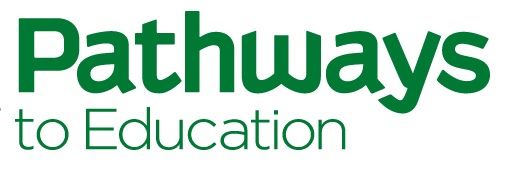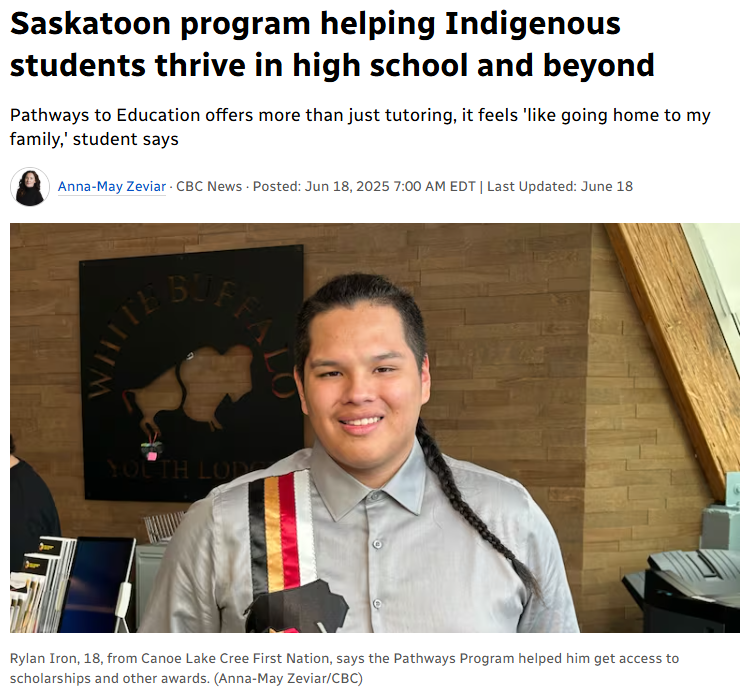As the school year draws to a close, it’s a time to celebrate the achievements of Pathways students and the community trailblazers who have walked beside them. Among them stands Pathways Saskatoon’s Program Manager: Darlene Lanceley, a Cree woman and band member of the Mistawasis Nehiyawak First Nation, a lifelong educator, student advocate, and activist in Indigenous rights and education.
After supporting four cohorts of graduates at Pathways Saskatoon, Darlene will be retiring after this year’s graduation ceremony. Her hope for today and tomorrow’s students is clear: “I want them to continually thrive. To say, ‘I deserve better’. To use their voice, because voice has got I-C-E in it—Identity, Choice, and Empowerment.”
This National Indigenous Peoples Day, we invited Darlene to share her journey of helping to shift the educational landscape for Indigenous people and her hopes for future generations of students.
I started my career in education in 1985—wow, that sounds deadly! At that time, we didn’t have a lot of Indigenous teachers, nor did we have Indigenous curriculum or land-based learning. The gaps we were—and are—dealing with have been ongoing in education for a long time.
From my own experience, I graduated from a high school where there were only three of us who were Indigenous. As kids nobody believed could achieve, finishing high school was the pact I had made with my cousin when we were 13 years old. However, in our lowest little whisper, we held this added hope, “Maybe we can go to university too.” I’m proud to share that my cousin and I both went on to become valedictorians for our university’s graduating classes.
| Darlene began her career in education over forty years ago at a First Nations daycare and sat on the Youth Council for the creation of a high school that would address the gap in culturally relevant classroom environments for Indigenous students in urban Saskatoon. Today, that high school, Oskāyak, is one of the schools that Pathways Saskatoon partners with. |
My whole career has centered around education, through many different perspectives, and advocating for how to improve life for tomorrow’s students. When I began teaching, the support and lens for First Nations and Métis students just wasn’t there. I would start the Indigenous Student Council at the University of Saskatchewan, and I’ve also been in curriculum writing and policy analysis and governance. Thirty-six years ago, on April 14th, 1989, I was part of the thousands arrested across the country for protecting our inherent right to education as Indigenous peoples. Even today, I’m still there, 25 in my heart, going, “I won’t comply!” It’s always been about making those changes.
For 130 years, Indigenous peoples couldn’t attend post-secondary institutions. It was illegal for us to be educated. Residential schools weren’t an education. Nobody graduated from there; they’re called survivors for a reason. But take a look at what we’ve been able to do here at Pathways Saskatoon: students are graduating on time. That’s powerful. That means they’re doing things in succession the way that they were always supposed to.
| A child of the Sixties Scoop, Darlene was one of the many Indigenous children who were forcibly taken from their own homes and communities. “My mother was a residential school survivor and I was able to locate her residential school file. She was number 383. And number 383 wanted to be a nurse,” Darlene shares. Through her work at Pathways Saskatoon, Darlene has been able to carry that dream forward by creating healing through education. |
Without Pathways, these students wouldn’t have been able to dream that they could achieve this. We’ve been able to show students how to embrace their future. Pathways has allowed us to have our Treaty Rights within this urban centre and be able to serve both First Nations and Métis youth at a magnitude that wasn’t possible before.
Once students come to Pathways, we can help them to start believing in themselves. Their marks are going up, we’re helping them with scholarships, we’re taking them on post-secondary tours, they’re finding a sense of play and safety. We’ve been able to provide opportunities for land-based learning and bring urban Indigenous students who have never been on reserve before to experience the peace found in nature. Students are reconnecting with their culture—they’re beading, making ribbon skirts, and coming with us to ceremonies like the Sun and Horse Dance. When you’re looking at the big picture, it’s all of these little steps that lead to the big graduation.
When I reflect on what we’ve been able to achieve, the student commitment is critical. Students can now see themselves in leadership roles. They are already leaders in the community for the next generation, and they are leading them in a good way.
| Since the local Pathways Program opened in 2017, Darlene has helped to reach Indigenous students in 58 different neighbourhoods in Saskatoon. What began with 42 students has grown to 350, with more than 200 graduates. This year alone, 61 students will graduate—many being the first in their families to do so. |
This is what breaking cycles looks like. I am a survivor of the Sixties Scoop and I’m the first generation to not go to residential school. My kids are the second generation not to go, and the first generation not to be taken from their homes. Our young people have broken cycles and they’re going to continue to break cycles.
I will always be so grateful for Pathways and the beautiful legacy I get to leave. It’s humbling to be part of an environment that gives students hope for what they can achieve. As a collective, these students are graduating. As a collective, they’re healing. As a collective, they’re making their dreams happen.
| Darlene and her team at Pathways Saskatoon have ensured that students can reconnect with their culture and learn how to embrace their futures. |
On this National Indigenous Peoples Day, we honour Darlene’s impact and the many young leaders who are carrying forward the cycle of achievement and possibility. For every student who walks across the stage this year, Darlene’s vision echoes in their success.
WATCH THE CBC NEWS FEATURE | Pathways to Education program helping more Indigenous students graduate:
READ THE CBC NEWS FEATURE | Saskatoon program helping Indigenous students thrive in high school and beyond:

